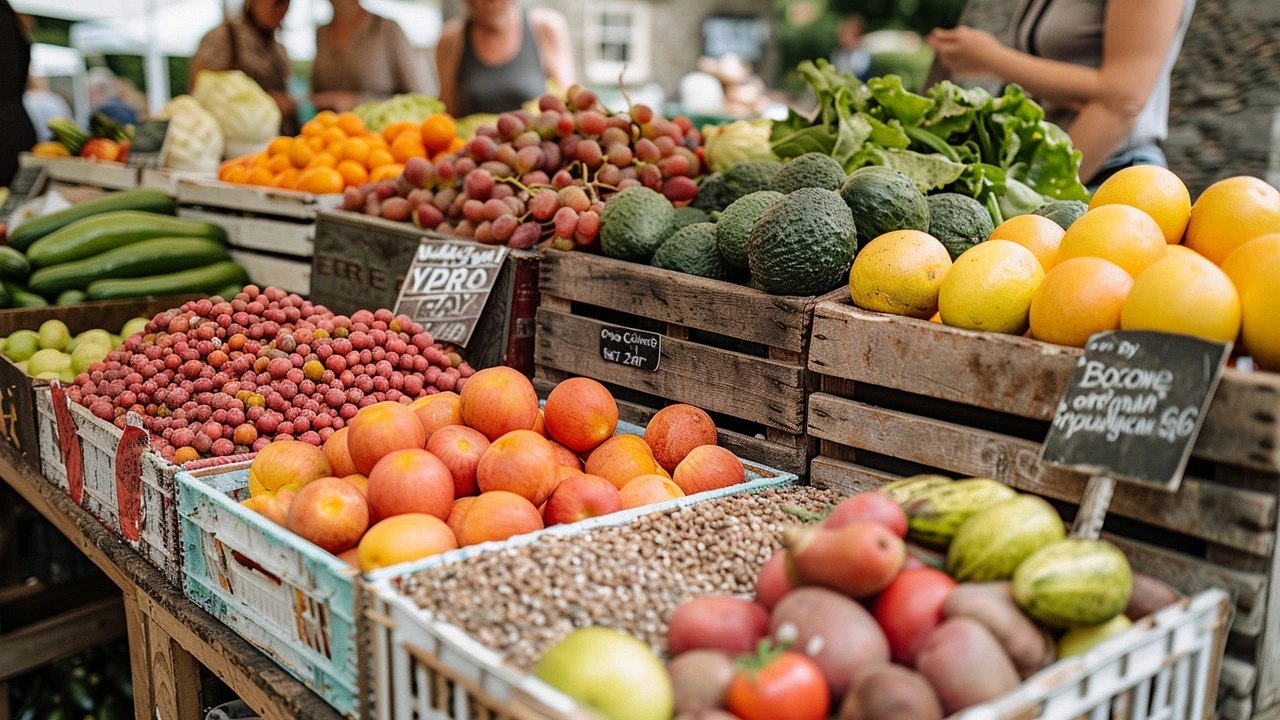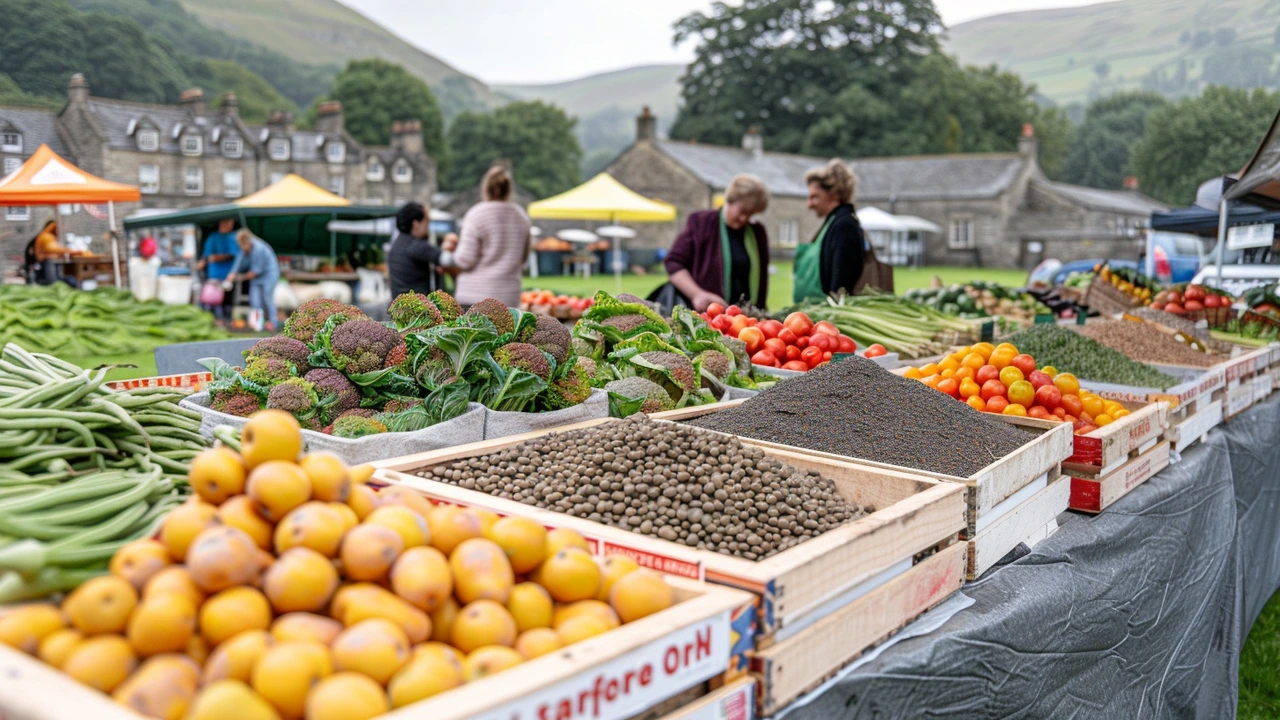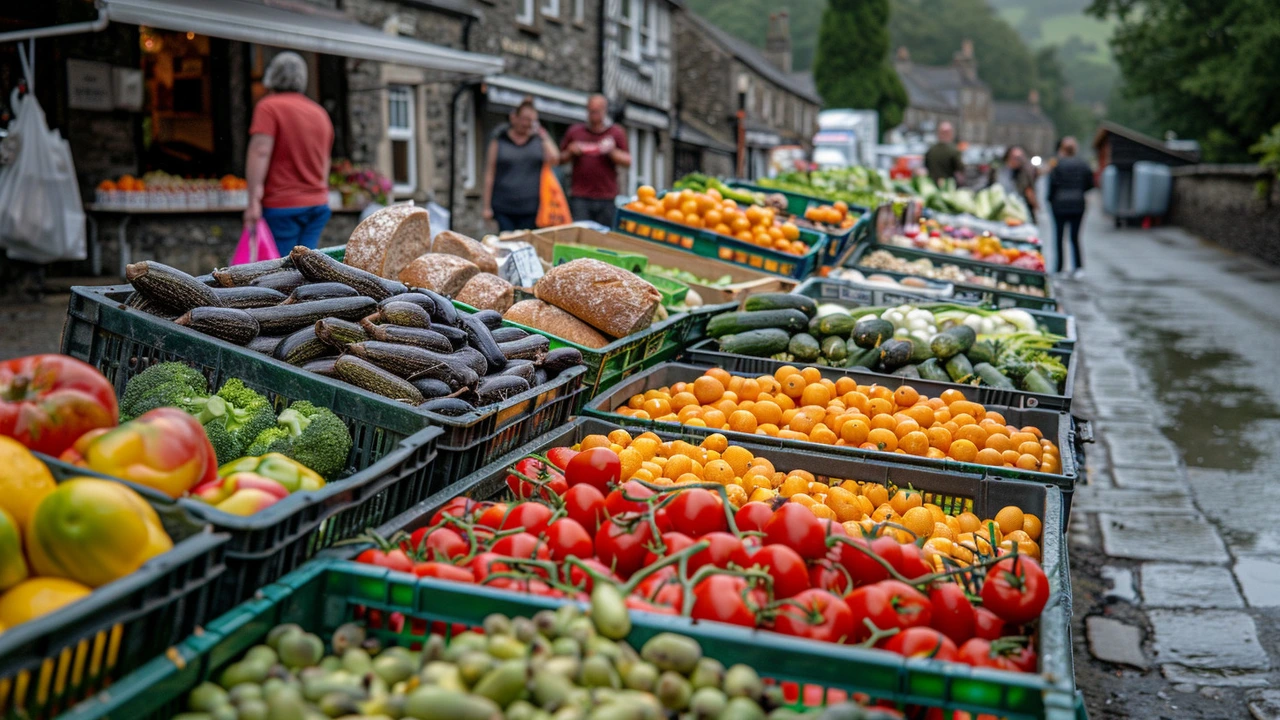The shift towards organic food has never been more evident as more people veer away from conventional produce. But what's fueling this change, and is it genuinely worth the hype?
Organic foods are cultivated without synthetic fertilizers, pesticides, and genetically modified organisms (GMOs). This approach ensures the produce is as close to its natural state as possible, preserving its nutritional integrity.
Research has shown that organic foods often contain higher levels of antioxidants, which are vital for combating free radicals that can cause chronic diseases. Furthermore, organic food production significantly reduces the exposure to harmful chemicals, making it a safer choice for you and the environment.
Are you wondering how you can seamlessly incorporate organic options into your daily diet? Start by identifying local farmers' markets or organic sections in your health food stores. And remember, some crops, such as apples and strawberries, tend to have higher pesticide residues, making organic purchases more impactful.
With numerous choices available, the journey towards an organic lifestyle begins with small changes. Prioritize fresh, wholesome foods, and gradually transition your pantry to support both your health and the planet.
- Introduction to Organic Food
- Nutritional Benefits
- Environmental Impact
- Tips for Buying Organic
- Incorporating Organic Foods into Your Diet
Introduction to Organic Food
Organic food is a term that has gained significant traction over the past few decades, yet its roots trace back centuries to traditional farming methods. At its core, organic agriculture avoids the use of synthetic chemicals such as fertilizers, pesticides, and herbicides. Instead, it relies on natural processes and cycles adapted to local conditions, which makes it a sustainable alternative to conventional agriculture.
Consuming organic food has many benefits, and one of the most discussed aspects is its impact on health. Organic crops generally contain higher levels of beneficial nutrients, including antioxidants. For example, a study published in the British Journal of Nutrition found that organic crops contained up to 60% more key antioxidants than their non-organic counterparts.
Aside from nutritional benefits, people also choose organic for its environmental impact. Organic farming practices aim to reduce pollution, conserve water, reduce soil erosion, increase soil fertility, and use less energy. Animal welfare is also a significant part of organic farming, as animals are raised in more natural conditions with access to the outdoors, which contributes to the ethical appeal of organic products.
It's also important to understand the certification process behind organic labeling. In the United States, the USDA (United States Department of Agriculture) sets strict guidelines that must be met for products to be labeled as organic. These guidelines cover everything from the use of resources and ecological balance to the maintenance of biodiversity. As of 2021, sales of organic food in the United States reached over $56 billion, reflecting a growing consumer trust and interest in these sustainably-grown products.
While organic foods can often come with a higher price tag, the benefits they offer—ranging from higher nutritional value to environmental sustainability—make them a worthy investment for many. If you're new to organic foods, it might be useful to start with particular items that are known to have higher pesticide residues when conventionally grown. These include strawberries, spinach, apples, and grapes, often referred to as the "Dirty Dozen." By prioritizing these items, you can reduce your exposure to harmful chemicals without breaking the bank.
"Organic food isn't just a trend; it's a return to the principles of healthy, sustainable living." — Dr. Jane Goodall
Transitioning to organic food doesn't need to happen overnight. Begin by incorporating a few organic items into your diet and gradually build from there. Remember, the goal is to nourish your body while also contributing to a healthier planet for future generations.
Nutritional Benefits
Organic food might sound like a buzzword, but it's a concept deeply rooted in the quest for better health. One of the most compelling reasons people choose organic produce is the nutritional boost it offers. In numerous studies, organic fruits and vegetables have been shown to contain higher concentrations of essential nutrients like antioxidants, vitamins, and minerals.
For example, research published in the British Journal of Nutrition found that organic crops have up to 69% more antioxidants than their conventional counterparts. Antioxidants are critical for preventing oxidative stress, which is linked to chronic diseases such as heart disease and cancer. With more antioxidants, organic fruits and vegetables help bolster your body's defense mechanisms.
"The concentration of antioxidants was substantially greater in organically grown foods," says Dr. Carlo Leifert, who led the study. "Switching to organic fruits and vegetables could have a significant impact on nutrient intake."
Another vital aspect is the reduced exposure to harmful pesticides. Conventional farming methods often rely on synthetic chemicals to keep pests at bay. These chemicals can leave a residue on produce, which you may end up ingesting. By choosing organic, you minimize this risk, making it a healthier choice for you and your family. Studies indicate that children who consume organic diets have significantly lower levels of pesticide metabolites in their urine.
Organic food can also offer higher levels of omega-3 fatty acids, particularly in organic meat and dairy products. These healthy fats are crucial for brain and heart health. A study from the University of Aberdeen brought this to light, showing that organic milk can contain up to 50% higher omega-3 fatty acids compared to non-organic milk.
Organic farming techniques promote soil health, which, in turn, affects the nutritional quality of the produce. Healthier soil fosters plants that are richer in micronutrients. Practices like crop rotation, composting, and the use of natural fertilizers all contribute to more nutrient-dense foods.
Improved Taste and Freshness
Many advocates of organic food claim it tastes better. This isn't just anecdotal; the absence of synthetic chemicals allows natural flavors to shine through. Organic produce is often fresher, as it typically doesn't contain preservatives to extend shelf life. This freshness can enhance both the flavor and the nutritional value.
Organic foods also lack artificial additives and preservatives, which can affect nutrient levels. The absence of these substances means you get a more natural, nutrient-rich product, free from questionable chemicals and fillers.
Switching to organic food isn't just a trend; it's a choice that can positively impact your health. With higher levels of several vital nutrients, reduced exposure to harmful chemicals, and improved soil health, organic food offers tangible benefits that go beyond just a label.

Environmental Impact
When we talk about organic farming, we're looking at a practice that holds a much kinder view of our planet. One of the stand-out benefits of organic food production is the significant reduction in chemical usage. Synthetic fertilizers and pesticides, common in conventional farming, can lead to soil degradation and water contamination. Organic farming, however, embraces natural methods such as crop rotation and composting to cultivate the land, maintaining its fertility for future generations.
Organic farming not only benefits the soil but also promotes biodiversity. By avoiding chemical interventions, organic farms become havens for a variety of plants, insects, and animals. These thriving ecosystems can better support pollinators like bees, which are crucial for our food supply. A study by the University of Oxford revealed that organic farms host 30% more species than conventional farms, showcasing the remarkable ecological benefits of organic practices.
Water conservation is another hallmark of organic farming. Without dependency on synthetic chemicals, there's a reduced risk of harmful runoff contaminating water sources. This method also encourages improved soil structure, which enhances the soil's ability to retain water, making organic farms more resilient to droughts. This resilience is becoming increasingly important as climate change continues to affect global weather patterns.
Let's not forget the impact on community health. The lack of chemical exposure means farm workers and nearby residents face fewer health risks associated with pesticides and herbicides. This cleaner practice not only ensures healthier food but also fosters healthier living environments for all involved. To quote the Environmental Working Group:
"Choosing organic is an easy way for people to protect themselves and their families from high levels of toxic pesticide residues."
Transitioning to organic food also drives consumer awareness and advocacy for sustainable practices. When you buy organic, you're supporting farmers who are committed to preserving the environment and promoting a healthier, more balanced approach to agriculture. This ripple effect encourages more producers to adopt organic methods, gradually shifting the market towards more eco-friendly practices.
Ultimately, opting for organic foods can be a powerful step towards a more sustainable future. By making informed choices at the grocery store, you're not only investing in your health but also casting a vote for the planet's well-being. Small changes can accumulate into significant impacts, proving that collective efforts in choosing organic can indeed weave a promising tapestry of sustainability.
Tips for Buying Organic
Shopping for organic produce can seem a bit daunting, especially if you're new to it. However, with a few practical tips, it's entirely possible to make informed choices that benefit your health and support sustainable practices. Let's dive into some best practices for purchasing organic foods to ensure you're getting the most bang for your buck while minimizing your exposure to harmful chemicals.
First, it's crucial to understand which foods tend to have higher pesticide residues when grown conventionally. Many resources, like the Environmental Working Group (EWG), publish annual lists such as the 'Dirty Dozen', which highlights fruits and vegetables that are more likely to contain pesticide residues. Items like strawberries, apples, and spinach often top this list, making them good candidates for organic purchases. On the flip side, the 'Clean Fifteen' list includes produce that is generally safe to buy non-organic, such as avocados, sweet corn, and pineapples.
Next, buying seasonal produce is a smart strategy. Seasonal fruits and vegetables are not only fresher and tastier, but they are also more affordable. For instance, organic berries in the summer are likely to be less expensive and more flavorful compared to buying them in the winter. Additionally, seasonal shopping supports local farmers and reduces the carbon footprint associated with transporting out-of-season produce.
Another tip is to get to know your local farmers' markets. These markets can be treasure troves for organic products. Engaging directly with farmers gives you the opportunity to ask about their growing practices, understand where your food comes from, and sometimes even snag a deal. Many farmers adopt organic practices but aren't certified organic due to the high cost and stringent requirements of the certification process. Building relationships with them can provide access to high-quality organic produce at reasonable prices.
For those times when a farmers' market isn't an option, many supermarkets have expanded their organic food sections. Look for the USDA Organic seal, which guarantees that the product meets strict federal guidelines for organic farming. In the grocery store, you might also find PLU (Price Look-Up) codes helpful; organic items typically start with the digit '9.' For example, an organic banana might have a code of 94011, whereas a non-organic banana has a code of 4011.
'Buying organic isn't just about personal health; it's about supporting an agricultural system that promotes sustainability, preserves soil health, and protects biodiversity.' — Maria Rodale, Organic Advocate
One effective way to economize your organic purchases is to consider bulk buying, especially for staples like grains, nuts, and meat. Some stores offer discounts when you buy larger quantities, and this can make a significant difference in the long run. Subscribing to a Community Supported Agriculture (CSA) program can also be an economical choice. CSAs allow you to buy a share of a local farm's harvest, providing you an assortment of fresh, often organic produce throughout the growing season.
Lastly, don't overlook organic frozen and canned options. Frozen organic fruits and vegetables are often more affordable and can be nutritionally superior compared to their non-organic fresh counterparts, especially when they’re out of season. The freezing process locks in nutrients, making them a viable option for health-conscious shoppers.
Remember, every organic purchase you make is a step towards a healthier lifestyle and a more sustainable world. By being strategic with your choices and implementing these tips, you can enjoy the benefits of organic foods without breaking the bank.

Incorporating Organic Foods into Your Diet
Transitioning to an organic diet might seem overwhelming at first, but with a few well-planned steps, it can become a seamless part of your lifestyle. One of the fundamental things to remember is that every small change you make is a victory for both your health and the environment.
Start by identifying which foods are most important to buy organic. The Environmental Working Group (EWG) publishes a list called the Dirty Dozen, which identifies fruits and vegetables that typically have the highest pesticide residues. These include strawberries, spinach, and apples. It’s a good idea to make it a priority to purchase organic versions of these items.
Shopping at local farmers' markets can be both fun and rewarding. These markets often have a vast array of fresh, organic produce. By building relationships with local farmers, you gain access to high-quality, seasonal foods and support local agriculture. Many small farmers may use organic practices but can't afford the certification process, so talking to them about their farming methods can be incredibly insightful.
Organizing your kitchen to support an organic lifestyle is another crucial step. Stock your pantry with organic staples like grains, beans, and nuts. This sets a solid foundation and ensures that when you’re cooking, you always have healthy ingredients on hand. Next, consider growing your own organic herbs and vegetables. Even if you have limited space, containers on a balcony or windowsill can yield fresh basil, tomatoes, or peppers. There’s something deeply satisfying and wholesome about cooking with ingredients you’ve grown yourself.
Incorporating organic foods doesn’t mean you have to give up on the convenience of modern grocery shopping. Many supermarkets now have a dedicated organic section where you can find everything from dairy products to packaged snacks. Look for certified organic labels to ensure you're getting genuine organic produce.
Meal planning can also be a huge help in maintaining an organic diet. Plan your weekly meals around seasonal and organic foods. This approach not only enhances the nutritional content of your diet but can also make meal preparation more exciting and varied.
For some, the cost of organic food can be a concern. To manage this, consider which items are most crucial to buy organic and which ones you can compromise on. For example, foods with thick skins that you don’t eat (like avocados or bananas) typically have lower pesticide residues and might not need to be organic. However, investing in organic meats and dairy can be quite beneficial as these products tend to accumulate higher levels of chemicals.
Education is key. Read up on new recipes or join local workshops that focus on organic cooking. Engaging with others on the same journey can provide valuable tips and a sense of community. One great way to stay motivated is to keep a food journal, tracking your intake of organic foods and noting how it impacts your health and wellbeing.
Remember, the journey towards an organic diet is a personal one. It’s about making choices that you feel good about and that align with your health goals and values. As Alice Waters, a pioneering chef and organic food advocate, often says:
“Good food should be a right and not a privilege.”Making even a small shift towards organic options can have a big impact on your health and the planet.
